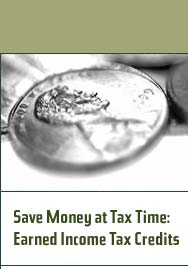

Record numbers filing bankruptcy: Other options, financial education key
to reducing money troubles
by David Flaum, The Commercial Appeal
Between them, Finis and Luquetta Parkerson have filed three bankruptcy petitions since 1998 to save their home. It didn't work. Not only is the home gone but so is their Thunderbird, partly because of a mixup over a creditors' meeting on their September 2002 petition. Their petition was one of a record 28,202 filed in the U.S. Bankruptcy Courts for Western Tennessee in Memphis and Jackson in 2002. The record no longer stands - 28,351 petitions were filed last year – and the Parkersons wish they were never among the filers. "I would rather have lost the house on its own merits than file," said Luquetta Parkerson, 45.
Their problems started when she was working and he wasn't. Unemployment and loss of overtime pay are prime reasons, along with divorce and medical bills, for most bankruptcy filings. To save the home she owned she filed a Chapter 7 petition nearly six years ago asking for her debts to be liquidated. Their lawyer told her she could keep the house but the mortgage company balked, the Parkersons said. No one mentioned credit counseling or other alternatives, they said.
In 2000 she stopped working and Finis Parkerson, 38, was in and out of jobs. After four years of wrangling over the house with little success they filed a Chapter 13 or "wage earner" case. They missed the meeting of creditors, the case was dismissed and both their car and home were repossessed before they could file again two months later. Although that reduced payments every two weeks to the court from $356 to $24, it left them without a car and forced them to move into his mother's Frayser home. Looking back, Luquetta Parkerson said she would have kept working. "We'd pay more on the house and let the small bills go until we caught up on the house payments," she said.
It is that kind of knowledge that could have kept the bankruptcy rolls from swelling, said Beth Dixon, president of the RISE Foundation, a group that helps housing project residents save money for homes and a leader of the Memphis Bankruptcy Collaborative. "You pay when you don't know," Dixon said. As for the slowdown in the growth of bankruptcy filings last year, Dixon said, "We're certainly not claiming victory but being on the front lines of lifting this issue up has made a difference in the degree of growth."
Not everyone is as optimistic.
"On the face of it (the filing increase) continues to be discouraging news," said Julie Heath, professor of economics at University of Memphis and chairman of the economics department. "Any increase in filings is a further indication that the health of the Memphis economy is not what it should be and does not reach to all the citizens of Memphis."
Judge David Kennedy, chief judge of the U.S. Bankruptcy Court for Western Tennessee, sees bankruptcy filings as a lagging indicator of the economy; the picture improves after the business climate does. But he takes a more positive view of the filing figures. "The Memphis economy is broad-based," Kennedy said. "It's not locked in to one or two segments." That diversity may have an effect on slowing the pace of the filings, he said.
Others believe Memphis gets a bad rap as bankruptcy capital of the United States because of the heavy emphasis on "wage earner" cases. Under Chapter 13 a person sets up a schedule to repay debts - normally a three- to five-year process - then sends money to the trustee every two weeks to cover those payments. Chapter 7, the other option for personal bankruptcy filers, allows someone to liquidate debts using the assets he owns. Debtors may only file one Chapter 7 petition every six years. But there are no limits on the number of times someone may file under Chapter 13.
In the Western District, including Memphis and Jackson, 19,383 of the 28,351 petitions filed last year - 68 percent - came under Chapter 13. The average nationally is about 30 percent, Kennedy said. History and culture have something do to with it, said Preston Wilson, a bankruptcy lawyer and member of the lawyers advisory council to the bankruptcy collaborative. Chapter 13 began in Memphis in 1937 with the Chandler act, named for Memphis congressman Walter Chandler, Wilson said. He worked with local businessmen concerned about getting money back from debtors during the Depression.
"And a lot of debtors in financial trouble would prefer to pay something to their creditors," Wilson said. "Chapter 13 does get results for people who are deeply in debt when nothing else will," he said. "It can stop a foreclosure of your home, halt repossession of a car or even allow you to get a repossessed car back and keep you from going to jail for not paying child support." Wilson said. "It does what it is supposed to do in many cases - help people get back on their feet," he said. "But for others, it's just delaying the inevitable."
That's because people don't arrive at a lawyer's office often until the eve of a foreclosure or repossession, he and others said. And some are not in a position to meet the repayment schedule of a Chapter 13 - so they file, refile and refile again. Judge Jennie Latta gets six to eight people a week asking to reinstate dismissed cases. "There was a person in my courtroom yesterday (Tuesday, March 16) who filed three times last year and his case wasn't going to be successful," she said. "He didn't make his scheduled payments because he didn't have the money to."
She declined to reinstate his case. "Filing Chapter 13 in this district seems to be an easy solution and it buys you more time," Latta said. "But it hurt him. Instead of taking action, like selling his home and getting some value from it, now he's facing foreclosure."
And, after three filings, his creditors are not likely to be as cooperative
as they would have been if he'd gone to them first, she said.
Latta, in a speech last fall to bankruptcy lawyers, judges and trustees, called on her colleagues to do a better job of screening cases because not everyone who wants to file a petition really needs to file and may benefit from other options. She wasn't willing to say that her comments were having an effect on the number of filings. "It's still too early to tell long term whether it will," she said. But that speech has a lot of people thinking.
"Her talk has made the lawyers more conscious of it (the filing problem)," Wilson said. "They're not filing four, five and six petitions for the samepeople." The judge's comments inspired the start of the lawyer's advisory council of the bankruptcy collaborative, Dixon said. "The idea of doing something different than bankruptcy has sunk in," said Jack Hogan, head of Consumer Credit Counseling Service in Memphis.
"But they often put off dealing with their problems until they have no other alternatives," he said.
Those in the bankruptcy community agree financial tutoring can improve that
situation. "The hunger for financial literacy in the school system and in householders is just overwhelming," Heath said. "It doesn't have anything to do with lack of eagerness to learn skills. People just haven't had the opportunity." And, Heath believes, they should get it, starting with five year olds in schools and building on the basics year by year.
This month, with the help of Conaway Brown, a Memphis advertising and public relations firm, the group is forming focus groups of people who have filed for bankruptcy to find out, among other things, what they would tell other people to do in the same financial circumstances, Dixon said.
Among other efforts of the collaborative to get people in the know is a brochure on bankruptcy the group plans to distribute this spring. The counseling service has fielded a number of requests for organizations, churches, libraries and civic groups for financial education workshops this year, a sharp contrast to a year ago. "There's a greater move toward education that we didn't really have last year," Hogan said.

|
Last year, MemphisDEBT, in cooperation with United Way of the Mid-South, hosted 16 Volunteer Tax Assistance sites over a three-month period to help low-income communities claim Earned Income Tax Credits (January - March 2003). Nearly 2,300 returns were processed. The average refund amount was $2,100, resulting in more than $4.8 million being returned to low-income families. It is estimated participating families saved approximately $460,000 in filing fees.
Contact MemphisDEBT to find out more. |